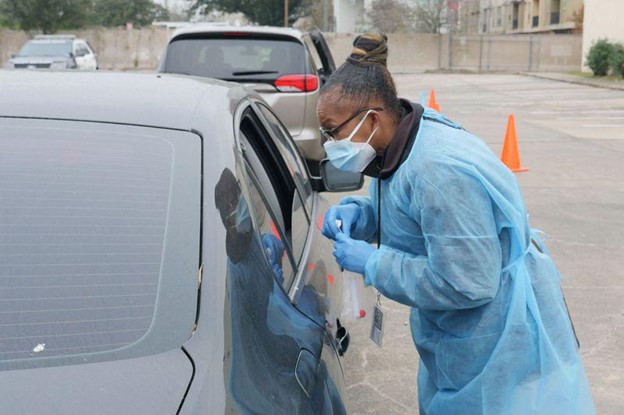
Epidemiologist: After Omicron, There Will be Newer Variant Virus Strains
Experts warn that Omicron's gusty explosion and progress is enough to prove it won't be the world's last worrying version of the COVID-19 variant. The picture shows Texas motorists queuing for testing. (Getty Images)
(We Chinese in America Media Editor Tang Zhao, January 16, 2022) Scientists have warned that Omicron's gusty outbreak and spread is enough to prove it won't be the world's last worrying version of the COVID-19 variant. "The faster Omicron spreads, the greater the chance of mutation, potentially causing more mutation," said Leonardo Martinez, an infectious disease epidemiologist at Boston University.
Omicron makes it impossible for relatively healthy people to work and go to school, and its ease of transmission not only increases the chance of infection, but also increases the likelihood of lingering in people with weakened immune systems, giving it more time to develop effective mutations. Stuart Campbell Ray, an infectious disease expert at Johns Hopkins University, also said, "Longer persistent infections seem to be the most likely breeding grounds for new varieties; this is only provided when the infection is very widespread."
Because the virus can evolve in more people, experts don't know what the next variant will look like, how it will affect outbreaks, no guarantees that they will be milder diseases, or whether existing vaccines will work. But experts stress that the vaccine is still effective today and that broader vaccination is necessary.
After Omicron appeared in mid-November last year, it swept the world like a prairie fire. Research has shown that it is at least twice as contagious as Delta and four times as infectious as the original version of the virus. Omicron is more likely than Delta to reinfect people already infected, causing "breakthrough infections" in vaccinated people while attacking unvaccinated people. The World Health Organization (WHO) reported a record 15 million new cases in the week of January 3-9, a 55% increase from the previous week.
Since the disease caused by Omicron does not appear to be as severe as Delta, experts believe this may indeed be the beginning of the virus's tendency to become milder than the common cold, since the virus won't spread as much if it kills the host quickly; but the virus doesn't always becomes less lethal over time.
Infection and vaccination have provided some immunity in most parts of the world. There are many possible ways for the adaptation and evolution of the virus, including animal infection and the virus mutating and then returning to humans, or double circulating infection of Omicron and Delta in humans. A mixture of these two types of traits.
To curb the emergence of mutations, scientists have emphasized continued public health measures, such as wearing masks and getting vaccinated. Although Omicron is more transmissible than Delta, the vaccine still provides protection, and the booster shot has greatly reduced severe illness, hospitalization, and death.
Rey's analogy is that vaccines are human armor, and even if they cannot completely stop the spread of the virus, they can greatly hinder the spread of the virus.
(Source: Compiled from Online Information)










